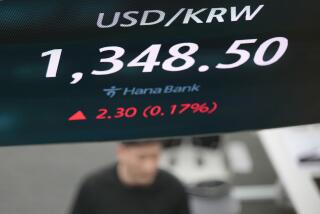In a First, Japan’s Key Stock Index Soars Past 30,000
- Share via
TOKYO — The Tokyo Stock Exchange broke through an important psychological barrier Wednesday when the Nikkei average soared above 30,000 points for the first time, reflecting investor confidence in a strong Japanese economy.
The Nikkei, an index of 225 stocks, rose 381.44 to close at 30,050.82, or 42% higher than its lowest level following the October, 1987, crash in global stock markets.
The topping of the 30,000-point barrier had been widely predicted to happen this week, and it symbolized unlimited expectations in a bull market that has astonished some foreign observers by surging ahead despite an apparent lack of fundamental strengths behind many shares.
“We don’t think this is going to be where it slows down,” said Robert Burghart, deputy manager of the Tokyo branch of SBCI Securities (Asia) Ltd. “The market will not be satisfied with 30,000 points.”
Financial Instruments Lag
Behind the inexorable climb in share prices in Tokyo are a number of factors, most significant of which is the sheer volume of liquidity that financial institutions are holding as a result of Japan’s massive trade surplus.
Institutional investors must place money where they anticipate the highest yields, and few financial instruments are keeping pace with capital gains on the Tokyo stock market. Japan’s domestic long-term bonds are offering only about 4.4% to 4.5% interest, creating a yield gap that makes stocks attractive.
A weak dollar, meanwhile, dissuades Japanese investors from taking foreign exchange risks by channeling too much of their portfolios into U.S. bonds and equities. Since the October, 1987, crash, stock markets in New York and London have lacked the vitality of the Tokyo exchange.
Brokers and analysts agree that trading decisions are heavily influenced by herd psychology or going with an obvious winner rather than by such fundamental measures of value as price-earnings ratios.
In technical terms, Wednesday’s Nikkei record was partly the result of a sudden buying spree during the last 30 minutes of trading, as speculators covered positions in stock futures contracts. Wednesday was the first closing day for these contracts since they began trading earlier this year.
But good news about economic growth would have spurred the index past the 30,000-point barrier soon anyway, analysts said. The Economic Planning Agency reported Tuesday that the economy expanded at a robust annual rate of 9.3% during the quarter that ended Sept. 30.
“The Japanese economy is very strong, and I think markets are a reflection of the economy,” said Joseph R. Hardiman, president of the U.S. National Assn. of Securities Dealers, who was in Tokyo for a conference establishing the International Council of Securities Dealers and Self Regulatory Assns. “My hope is that the Japanese market will have a positive effect on the U.S. market.”
The Tokyo Stock Exchange is now the world’s largest equity market in terms of total capitalization. Shares are in short supply, however, because of a practice of cross-holdings among conglomerates, banks and affiliated companies, thus adding to the upward pressure on prices.
Some critics also argue that collusion, price manipulation and insider trading are rampant--and largely condoned by authorities--in Tokyo, ensuring that, on the whole, what goes up will continue to rise.
The Japanese political world is now reeling from an insider trading scandal stemming from ethically questionable, but ostensibly legal, transactions in which privileged investors purchased unlisted shares in Recruit Cosmos Co. and later sold them at exorbitant profits on the over-the-counter market.
But the scandal has had only minimal effect on trading. When Mitsubishi Motors listed its shares for the first time on the Tokyo exchange Monday, bidding soared 70% higher than the initial offering price, despite attempts by large brokerages to restrain speculation.
No Precedent for Enforcement
Laws on insider trading have been made tougher since the Recruit scandal broke, though, and authorities seem poised to crack down on the most obvious abuses.
Hardiman said strict policing of securities fraud in the United States has evolved out of a long history of enforcement and litigation and that regulation in other countries must likewise evolve out of local customs and practices.
“I don’t think you can just extrapolate the U.S. experience and transport it to Japan or any other place,” he said.
Setsuya Tabuchi, chairman of Nomura Securities and head of the Japan Securities Dealers Assn., said that although Japan’s securities laws are nearly identical to those in force in the United States, there is “no precedent” for enforcing the law on insider trading here. “I expect that in the future Japan will gain experience in enforcement,” he told a news conference.
Wednesday’s breaking of the 30,000-point barrier came two years after the Nikkei average crossed the 20,000 level, which had only three years before exceeded 10,000. It had taken more than three decades for the index to rise to 10,000.
More to Read
Inside the business of entertainment
The Wide Shot brings you news, analysis and insights on everything from streaming wars to production — and what it all means for the future.
You may occasionally receive promotional content from the Los Angeles Times.










